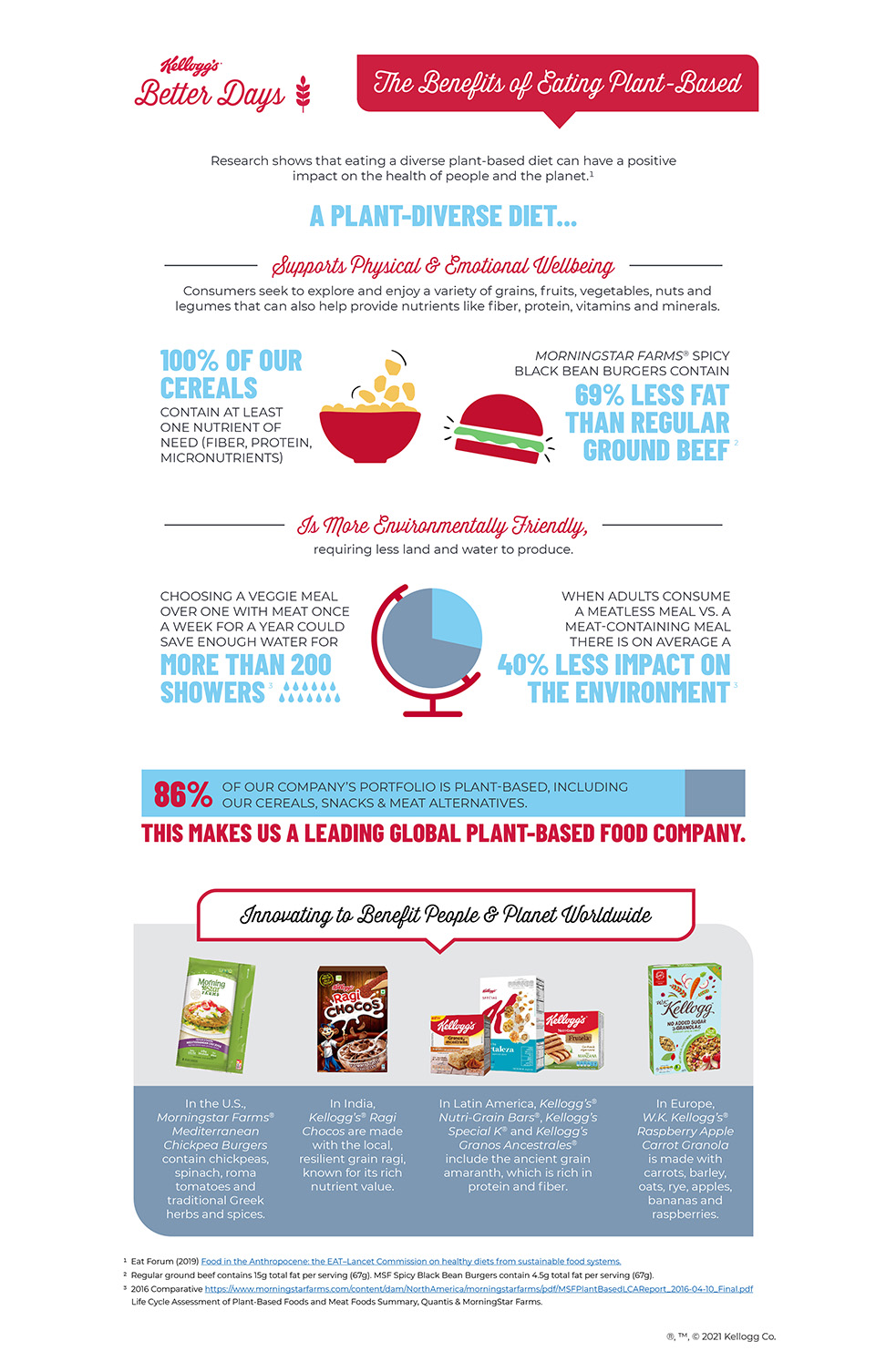Nourishing people and the planet with our plant-based foods
Kellogg uses a wide variety of ingredients to advance the physical and planetary benefits of plant-based eating
Benefits of Plant-Based Eating
W.K. Kellogg had it right all those years ago. As an original wellbeing visionary, he founded our company on the then-new scientific understanding of the importance of nutrition and the benefits of a plant-based diet. Since that time, a lot has changed. Global food production has ramped up to the point where there is enough food to feed 9-plus billion people worldwide, yet there are still 820 million people1 that are food insecure, and that number is predicted to double as a result of the coronavirus (COVID-19) pandemic2. Unfortunately, the world’s food system is narrow and siloed, and the health of our planet is suffering. Together, we must transform this approach to reduce its impact on the environment.
Today, research shows that eating a plant-based diet can have a positive impact on the health of people and the planet. Our company’s portfolio is 86% plant-based, including our cereals, snacks and meat alternatives, which makes us a leading global plant-based food company. As such, Kellogg plays a unique role in this transformation by introducing foods that support the physical and planetary benefits of a plant-based diet.
Looking at innovation in a new way to benefit people and the planet
Kellogg has long focused on the many benefits of grains and we know that growing and eating a greater variety of plants can benefit our overall wellbeing and support a more sustainable food supply for generations to come. Today, we offer a greater variety of plant-based foods than ever.
For example:
-
Kashi® Grain Free Coconut Almond Chewy Granola Bars are made with diverse plant-based ingredients, including sunflower seeds, coconut, almonds and pumpkin seeds.
-
W.K. Kellogg’s® Raspberry Apple Carrot Granola introduces carrots to the granola category, along with barley, oats, rye, apples, bananas and raspberries.
-
Morningstar Farms® Mediterranean Chickpea Burgers are made with chickpeas, spinach, roma tomatoes and traditional Greek herbs and spices.
A plant-based diet improves our physical wellbeing
A plant-diverse diet promotes the consumption of food like grains, fruits, vegetables, nuts, and legumes, which can help provide nutrients like fiber, protein, vitamins and minerals. Kellogg’s® cereals, for example, deliver important nutrients such as fiber, B vitamins and iron. And our MorningStar Farms black bean burgers have 72% less fat than regular ground beef and deliver 9 grams of protein.
 |
Plant-based diets are more environmentally sustainable
Plant-based foods also have a lower environmental impact, requiring less land and water to produce. A few years ago, Kellogg conducted a life-cycle assessment on the environmental benefits of plant-based dietary choices. The study3 found that an adult choosing a meatless breakfast, lunch or dinner ‒ rather than one that contains meat ‒ reduces carbon footprint, water use, and other environmental indicators on average by 40%.
It’s estimated that there are 30,000 edible plants, yet we only eat 150 of them. And just three main plants ‒ corn, rice and wheat ‒ account for more than 50% of the food people eat globally.2 This current food system approach of growing the same crop on the same land, year-over-year, depletes important soil nutrients that reduce the amount of food we can grow on each acre of land.
“By cultivating new types of ingredients and introducing a variety of crops in rotation, we can boost soil health and productivity,” said Amy Senter, chief sustainability officer. “Doing so will also help support agro-biodiversity and the wildlife that need agricultural lands to thrive.”
Kellogg is working with farmers to improve the sustainability of our future food system
As more people enjoy the benefits of diverse, plant-based foods, we are continuing our work to drive a resilient and responsibly sourced food supply. Kellogg supports farmers and workers as they adopt increasingly sustainable and regenerative agriculture practices that help promote soil health, protect agro-biodiversity, halt deforestation and mitigate greenhouse gas emissions.
As part of our Kellogg’s Better Days® global purpose platform and our commitment to create Better Days for 3 billion people by the end of 2030, we’ve already supported more than 436,000 farmers, especially women and workers around the world. Together with our suppliers, NGO partners, technical partners and others, we’re assessing areas of opportunity for improvement, sharing best practices and measuring outcomes to make step changes across the food system.
“Today, we understand that food is the single strongest lever we have to concurrently optimize human health and environmental sustainability,” said Alyson Greenhalgh-Ball, senior director, Global Health and Wellbeing. “The global adoption of healthy diets from sustainable food systems has the mutual benefit of helping to protect our planet and, at the same time, improve the health of billions.”
 |

